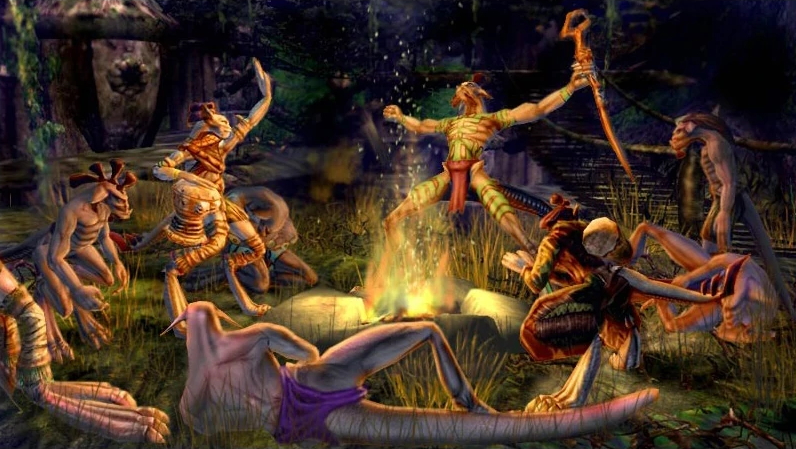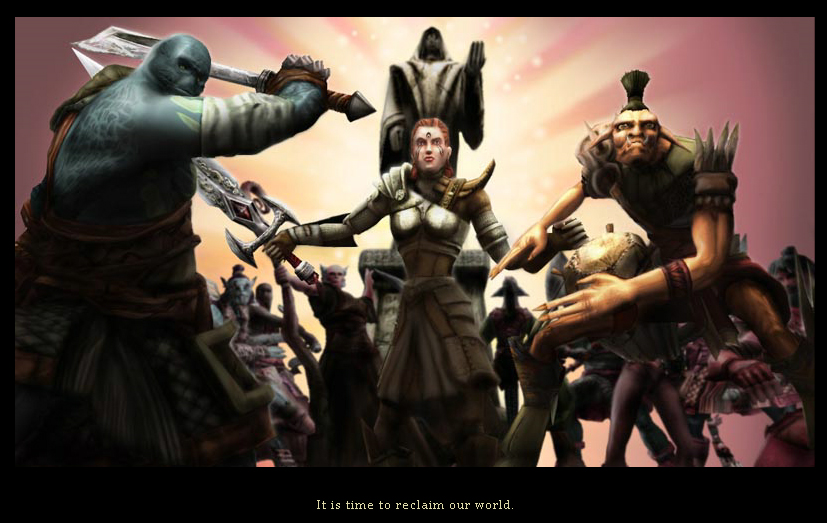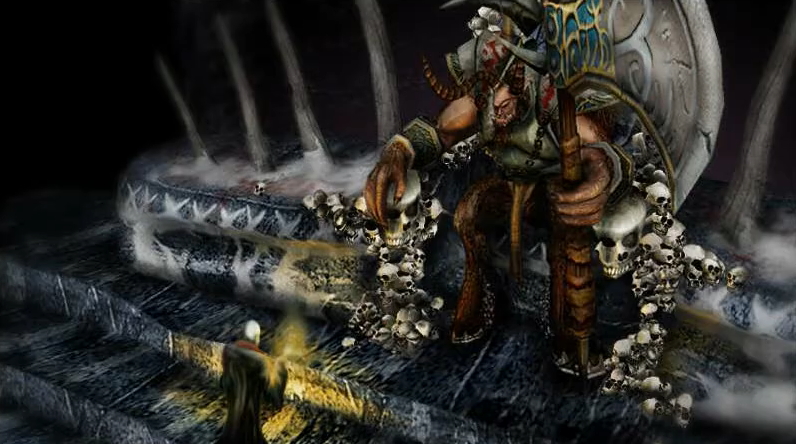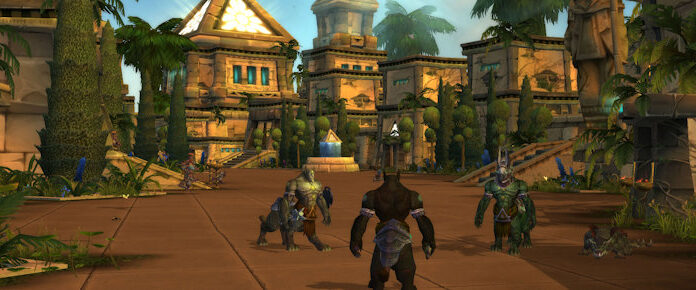
Just based on lore alone, WB Games should make a new Asheron’s Call game. As I argued last time, AC has the qualities of an underutilized Marvel Comic IP but the modern fantasy sensibilities of Game of Thrones or Dragon Age. The latter reference is especially important because online titles with strong, consistent lore and lots of player choices have actually been gaining traction in the gaming world. It’d only make sense for WB to make use of that kind of potential, especially while retro gaming and social play are “in.”
But video games are not just about story. Even in a choose-your-own-adventure situation, design and mechanics mean something. In fact, Asheron’s Call 2 launched with many features World of Warcraft would later make famous: guided quests to reduce/eliminate the need to grind levels, PvP points to unlock rewards, and cutscenes. Besides the fact that Warcraft was the more popular IP, Blizzard also didn’t have Microsoft forcing it to use a hobbled, broken chat system or launch before it was ready.
But rather than whine about that, let’s talk about why AC was worthy of a sequel in the first place – from a mechanical perspective.
All hands on deck
Before we jump into the thick of things, let me reiterate my basic elevator pitch to WB Games:
“Look Warner Bros, you can make an original IP for your next game title, use another movie/show tie-in, or you could use Asheron’s Call. The established lore is practically usable as is (and already has established crossovers), the trendy ‘season passes’ other games have are like monthly updates the AC fanbase is used to, and community events are what made Asheron’s Call stand out. Your next game will mostly likely have those features, so why not use an established IP to also gain access to a gaming community that would be thrilled to do testing and give feedback? They already run their own servers, so you know they can not only test content but help create it. Making your own IP is a lot more work, and an established but well known-one means you’re more at the mercy of fans with high expectations.”
I don’t mean to suggest WB should slap the AC title on any old game, but I do think that even a bad game could help demonstrate the strength and passion of the community, especially because the community already runs its own servers. While fan art, music, and articles like this one are great for catching the public’s attention, technical aptitude is needed to actually make a functioning game. Movies can get a lot of help from fans who know the IP, but games need technical know-how, and AC fans have that. Why not give them a chance to help build something profitable when they’re already supporting it for free?
Blizzard’s Jeff Kaplan actually started out as a high-end MMO player who aggressively ran an EverQuest guild and created custom game maps. The company later recruited Ryan Masterson, a high-end Hearthstone player, specifically to help with developing Hearthstone. While Blizzard has seen better days as a company, team members like Kaplan stand out because you can tell they aren’t just working a job but turned a hobby into a career. While not everyone can make that transition, I know there are Asheron’s Call private server operators who basically are doing this right now, just without pay. Obviously WB has its own hierarchy and people, but one issue with using an established IP is showing it some respect. Bringing in old devs and also people holding the game up right now, even just as consultants, could generate hype and goodwill. Oh, and of course making sure people have an idea of what made the series work.
I’m sure someone at WB is an AC fan. Next time there’s an idea for a game but no hard setting yet, bring that person in. Ask her if it might work with the Asheron’s Call franchise. Not everyone will agree, but some of us would just like to see Dereth come back in some form and would toss money just to show the IP holder we’re serious. That being said, this is a game franchise, and it did do some things that modern gamers really can appreciate.
Pushing content
Monthly content was a staple of the AC series. Not just a new themed PvP season or double experience weekend, but new dungeons, new creature types, new weapons, updated mechanics (not merely bug fixes). You paid a monthly subscription because you knew the game world was growing.
Pokemon GO in particular is pushing out a lot of content these days, but the event release rate seems too fast and distracts from recent content. By comparison, AC had seasonal events you usually had a month or longer to participate in if it was story-based, but in general, that content was there forever. Sometimes GMs even took over lore characters for live events that happened once and only once.
What AC did was give players meaty content, rarely with explicit gating but forcing players to do a bit of exploring. The usual three-month-or-longer waits followed by a requirement to buy an expansion pack may be the industry norm, but AC was a better value because those “big expansions” instead came out in small pieces across a few months, along with a compelling story players felt part of. In fact, AC had but two expansions in 15 years, and I would argue that its biggest, most defining story arcs happened outside of those expansion releases.
AC also was almost the anti-raiding game, unless you count PK raids. It’s not that the series lacked it; it’s just that the best loot in the game often came from randomly generated content, making it so any adventure could potentially lead to great gains. Heck, there was a luck-stat in AC2 to support this! Combined with item modification crafting that required quality items to be sacrificed for quality power, there was a good balance of random chance and intentional enhancement to motivate players.
I’d argue raids in the AC series were often more about lore and having a social event. They were one-and-done, often repeated to help newer players, making it arguably even more social. Instead, events and dungeons progressed the story in interactive ways, sometimes even literally letting players choose how plot lines would be resolved. The use of giving players voting opportunities in-game through their actions is quite simple but dishearteningly underutilized in online gaming.
A decline in raids as central MMO content has been a welcome trend for many longtime MMO genre gamers, and WB could fill this gap simply by embracing the idea that players and developers can work together to make a story. And as I said before, anything devs develop while anticipating player choices can be recycled in other mediums or just in cross-dimensional events, as AC already established that timelines in the canon lore can be altered.
Let’s be honest: Raid content often gets outdated. Look no further than the entirety of World of Warcraft, which has now spent years feebly attempting to rehabilitate such content for modern players. I’m not saying that AC never updated old quests, but much as in something like Dragon Age, each part of the world had its own stuff to worry about. Consider Game of Thrones again: A horde of undead marching towards the mortals doesn’t necessarily mean everyone’s suddenly friends. The problem with huge, story-based “end of the world” scenarios is that it makes a lot of work for the devs. Monthly updates mean you can make changes as needed.
Ever-changing world
Asheron’s Call wasn’t just about story arcs. Its rare item system didn’t use random loot, but it did give players a way to increase their chance of finding something cool, both passively and actively. Players even got a kind of warning when it was finally their day to find a rare.
Imagine tying that to quests or having special NPCs or dungeons randomly appear. The latter was actually something both AC games had, so finding it and knowing that you were in a kind of exclusive dungeon that was randomly generated and would disappear if you died was unique experience. You’d be surprised how much people enjoy randomly appearing events.
They can’t be the norm, of course. If there are 20 different kinds of random events that get cycled through, it’s not so special. Think back to the Dragon Age/GoT examples: If everyday life has multiple factions waging war against each other and the player is just tilting the scales one way or another until something breaks – or until devs explicitly create a path and story arc to do so – then random events help break up the grind, figuratively. I don’t think it’d need explicit levels. AC players were more the exploration type, so items, “spell research,” unique quests, maybe even witnessing certain events could lead to stat increases and new skills.
Speaking of events, I hate to admit it, but the days of gamemaster-crafted and -led events may be largely behind us. We’ve heard too many stories of corrupt GMs and people upset that the event took place while they were at work, which is sad. Seeing Asheron take on other lore characters, to be invited to talk with them and become part of the game’s canon… that’s something a lot of large-scale games just don’t do. That doesn’t mean they can’t be simulated, though.
EVE and Darkfall rarely has/had GM events, but player-made story arcs are huge. Mass media huge. AC had them too on Darktide, but the developer-driven ones are what are remembered. Player-made events let players become part of the game’s lore: Mythrandia, Vidorian, Maggie the Jackcat. These are all famous players whom many AC vets will remember from stories alone, if not virtually meeting them, and not all of them were warriors. Creating a story-arc players can participate in or even start themselves can be both empowering and potentially make content creation easier for the developer.
In 2021, we could see these again. Using the allegiance system, WB Games could occasionally allow people with enough followers/rank control tools for creating game events, no matter what genre the game ultimately embraced. I’ll try not to fan-out about how the game could be as in-depth as a PC/Console/mobile cross-over or as light as a choose-your-own-adventure test game, but the devs could let leaders spawn invasions, align with enemy MOBs and empower them, install points of interest… things we’ve seen other games do already.
It could also go the crafting route. Think World of Warcraft’s Ahn’Qiraj War Effort quest for the servers. Perhaps monarchies (AC’s guilds) need to gather components for a powerful spell that might release a potential ally or enemy. Maybe other players need to develop wards to protect against that spell. You wouldn’t even need direct PvP in these scenarios, though there could be areas where PvP is enabled and it’s possible to harvest the materials faster. The infamous Shard of the Herald event worked, not just because it was built up and required lore knowledge to progress but because when the event got “hot,” players of all skill levels and playstyles could participate.
It’s not so cutting-edge, but as the AC playerbase already expects these things, I’d argue they’re more capable of creatively utilizing them. They’ve had practice.
Planning long-term
Let’s be honest: As most games get on in years, they tend to go through the same issues of stat bloat, economy bloat, skill bloat, and feature bloat.
Asheron’s Call actually had answers for many of these before it was really needed, and I’d argue many can address modern-day issues. Let’s take the spell economy for example. Spells were more powerful if fewer people used them. When Flame Bolt 5 was over-used, the devs had to create a separate, similar spell, Dark Flame, to help balance it out.
Similarly, the game’s spell economy failed because information was overshared. Unless WB wanted to release abilities via redemption codes, modern dataminers would exacerbate this two-decade-old issue. Maybe what developers could do is reuse the system but plan for greed to lose out in a way. What if characters with the right skills/stats could learn to anticipate, dodge, defend, absorb, redirect, or outright counter specific spells and abilities by having them used on them or witnessing them? What if it wasn’t just spells, but melee and ranged abilities too?
Now, that may lead to ability bloat, but if defense skills are automatic and based on stats/skills, frequency they’re witnessed, and how recently the ability’s been encountered, and if the combat system limits what you can bring to combat ala the Guild Wars series, people have interesting choices to make. For example, Dark Flame from the above example would initially deal more damage, and in our case, be harder to defend against – at first. As more people figure out how to learn the skill and use it, it’s damage will go down and defense skill against it will go up. Players then need to decide if Flame Bolt 5, which people can probably have defenses for already, will deal more damage because it’s less popular, and at some point it may be harder to defend against once Dark Flame is the norm.
Skill/spell knowledge could be “lost” if not used enough or mutate, allowing the devs to cycle through a similar ability which also gives players the option of using side-grades. But WB could also do something similar in other aspects of the game: Spells/abilities may be used to recycle OP items or maybe even characters. The original game had consumable spell components plus something called tinkering, a kind of item enhancement.
Imagine a spell that requires an OP item the devs don’t want to nerf but want out of the trade system. Maybe a lore character can be killed only with that spell. Or perhaps a certain ability is broken, but if players surrender their knowledge of it in a ritual, they gain access to a new location. You could turn a broken item into a high-grade crafting component, or if we want to live dangerously, even have high-end spells that perhaps require permadeath from one or more players to cast. Obviously risk vs. reward is important, but the early days of Asheron’s Call had mages akin to mini-SWG Jedi. I think as long as people know the risks and stakes, it’s a fun option to have.
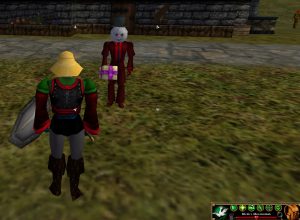 Personal flair
Personal flair
Customization is king. AC let you be a battle mage, but you could also be a sword-swinging chef. The AC series as a whole isn’t known for balance, though. In both games, certain abilities were seen as far superior to others. The sword-swinging chef probably couldn’t stand toe-to-toe with the battle mage, but I think there’s a case to be made for having fun characters.
Admittedly, I think many MMOs strip away mechanical customization and stick with appearance customization because they’re aimed at competitive players, but look at Animal Crossing. Hugely successful, sold a whole console system to some people. The economy is a bit out of control, but many people still enjoy it. Combat isn’t everything.
Or consider Dungeons and Dragons for a moment. Imagine the battle mage and sword chef are tasked with attacking a corrupt king. While the battle mage can probably take a lot of the soldiers out on her own, the sword chef could maybe bring some ingredients and cook meals for starving citizens to get them to support him. Maybe the soldiers will stand down because their families have been mobilized against them. Heck, maybe taking this route might allow the chef to gain a royal title and sit in on the new ruler’s council. It sounds like something Dryreach could be utilized for.
Or maybe WB wants to keep it largely combat-based. AC2 had a kind of cantrip system where you could choose bonuses for your character. You could be better at hunting outside in the open or inside a dungeon. Maybe your character is better at hunting during the night – or maybe during the day. Heck, I remember my AC1 character was pretty underpowered on his own, but because all his experience and training was in direct combat, buffs made him quite a force to be reckoned with. Simple choices like that can make people feel more connected to their characters as well as help them carve a space in their virtual world.
And remember, you don’t have to make raid content. Maybe in autumn NPCs need help with the harvest and will pay you with costumes. Maybe the new year brings a new race that attacks the capital, and the next month brings an emissary with whom players can ally in exchange for eventually unlocking them as a player race.
We don’t need to constantly be fighting, either. Leveling up skills through XP points shouldn’t be the only way things work. Eric Heimburg, a former AC2 dev, is behind the very creative Project Gorgon, the one MMO many former AC players seemed to flock to other than AC emulators, and for good reason. No one pretends it’s the best MMO, but it’s hands down one of the most creative, and it specifically offers avenues of player beyond just mundane combat. That being said, it’s also a labor of love and it shows. I don’t want to say cancel PG, but Heimburg is one of several former AC devs still around in the genre and has talents that I’d argue are not often seen in the mainstream.
The tools and audience are there, just fragmented. PG shows that players respond positively to unique ways to skill up. That they don’t need to be more powerful. Sometimes you just want to do interpretive dance as a cow. That’s a real thing in a real game, and while I don’t think I exactly need that in Asheron’s Call, if that cow were in AC, I would sacrifice myself to help it level up. While every AC player can talk about a unique build from either game, AC1 players in particular had worlds they left a mark on. Customization shouldn’t just be about our own characters, but our virtual worlds too, and the Asheron’s Call series has done that in ways few other non-PvP-centric games have. I’d love to see WB make it happen again.
 Everyone has opinions, and The Soapbox is how we indulge ours. Join the Massively OP writers as we take turns atop our very own soapbox to deliver unfettered editorials a bit outside our normal purviews (and not necessarily shared across the staff). Think we’re spot on — or out of our minds? Let us know in the comments!
Everyone has opinions, and The Soapbox is how we indulge ours. Join the Massively OP writers as we take turns atop our very own soapbox to deliver unfettered editorials a bit outside our normal purviews (and not necessarily shared across the staff). Think we’re spot on — or out of our minds? Let us know in the comments!
